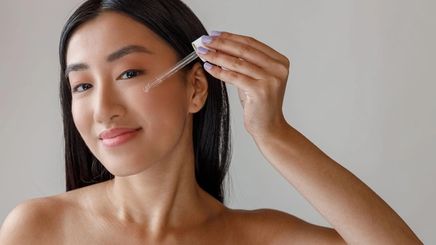
Growing up, you probably thought you needed to scrub your skin to achieve a glowing complexion. Perhaps you saw images of women indulging in a or running a all over their limbs as a form of self-care. While these methods still exist, a new, gentler mindset has emerged on skin renewal. Enter chemical exfoliation.
While chemical exfoliation can sound intimidating for the skincare newbie, many enthusiasts swear by it as an effective way to get rid of dead skin cells on your face for a smooth and radiant complexion. Read more to learn how your skin can benefit from a chemical exfoliant.
Chemical vs Physical Exfoliants: What’s the Difference?
Exfoliation refers to sloughing dead skin cells, oil, dirt, and grime from the skin using various methods. The most popular are exfoliation.
Scrubs such as microbeads or sugar grains and other methods like cleansing brushes fall under physical exfoliants. These refer to anything that mechanically rubs off dead skin cells. Physical exfoliants have their own benefits, such as improving skin circulation. It can give your cheeks a rosier appearance and help your skin absorb skincare products better.
Yet while physical scrubs are effective, they put you at risk of over-exfoliating and disrupting your skin barrier, especially when you have dry or sensitive skin. Large grains such as fruit pits and nut shells can cause micro-tears in your skin, making you more susceptible to skin infections. If you suffer from or dermatitis, physically exfoliating your face may cause your skin to flare up.
Meanwhile, chemical exfoliation refers to using acids on your epidermis to target problem areas and increase cell turnover. Contrary to popular belief, chemical exfoliants can gently reveal renewed skin underneath.
Several exfoliating acids in gentler formulas are available. Your dermatologist can also prescribe stronger exfoliants or recommend a chemical peel. Over-the-counter products usually contain . Your choice of acid should depend on your skin’s condition and needs.
AHAs, such as , are water-soluble and can improve skin texture, smoothen , and reveal healthier, more radiant skin. Meanwhile, BHAs are oil-soluble and are suited towards oily and acne-prone skin, working the insides of the pore to help remove blemishes such as blackheads. is a popular BHA.
How to Use Chemical Exfoliants for the Face
With an ever-growing range of options on the market, it can be challenging to figure out where to start. Here's what you need to know about safe and effective chemical exfoliation.
Know your skin type and identify your skin concerns.
According to the American Academy of Dermatology, it’s essential to know your skin type before settling on the best kind of exfoliant for you.
AHAs are generally the most versatile because they can resolve various skin concerns. They are best for skin types prone to and mature skin. That said, AHAs can make your skin sensitive to , so take precautions before going out in the sun.
Meanwhile, BHAs are best for acne-prone and oily skin. Because they penetrate the pores, they work to control sebum and have anti-inflammatory properties, keeping zits and redness at bay.
Introduce one product at a time.
When it comes to skin care, less is more. Introducing several new products to your face can overwhelm your skin and cause problems. Slowly work your new hauls into your routine. If you use chemical exfoliants, skip the step where you physically scrub your face. Avoid layering new products so you can track your skin’s reaction better.
Follow up with a gentle facial routine.
Whether you use AHAs or BHAs, your exfoliant will do much of the heavy lifting in treating your most pressing skin concerns. Following up with a gentle and nourishing facial routine will give your face some well-deserved TLC.
Use a gentle facial cleanser that won't dry out your face. Dove Facial Cleansing Mousse Moisture Care keeps your face smooth and plump for 24 hours with its 40% Active-boost Serum and . You can also use a toner to remove all traces of dirt and makeup while refining your skin texture; reach for Eskinol Deep Cleanser Papaya Smooth Glow that renews dull skin.
Finally, don’t forget to wear sunscreen even while indoors! It’s an often overlooked yet crucial part of a skincare routine as it shields your face from UV rays. Try POND'S UV Bright Sunscreen, a lightweight and non-sticky sunscreen that protects your skin against the sun and dark spots while brightening your face.
Gone are the days when exfoliation meant rubbing abrasive beads on your face to slough off dead skin cells, dirt, and grime on your pores. With chemical exfoliation, you can gently and effectively renew your complexion to make it smoother and more radiant.